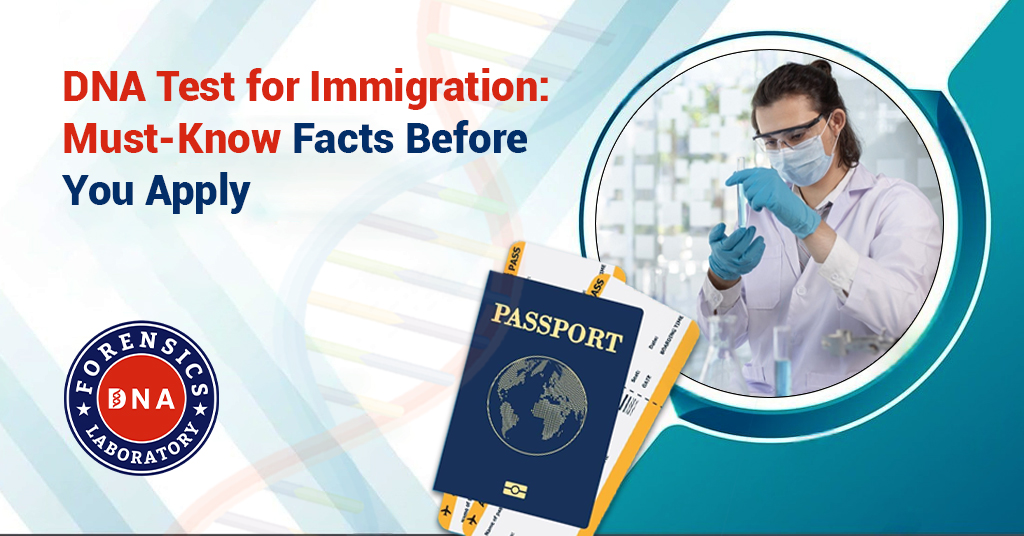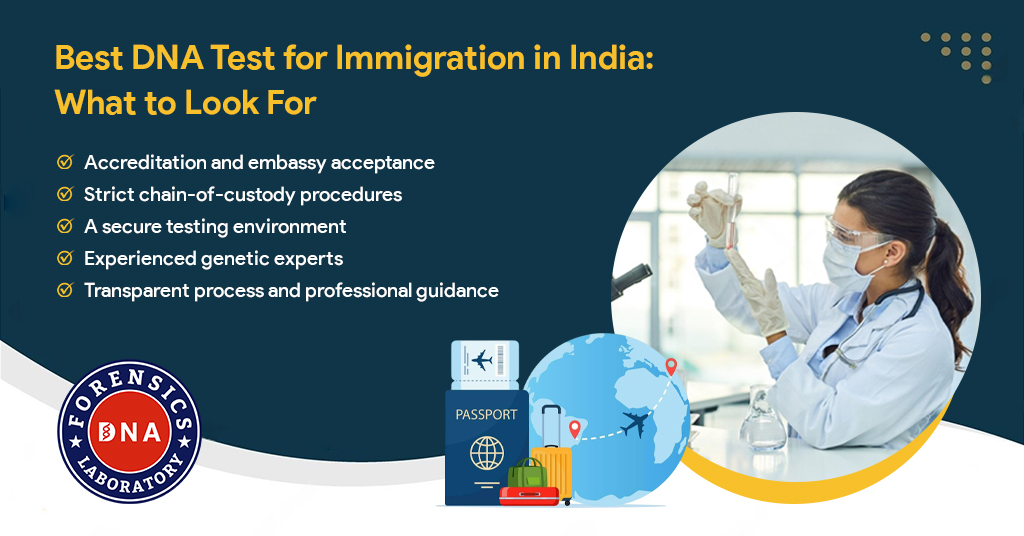
When people begin their immigration journey, one of the first questions they ask is whether a DNA test is required for the process. The truth is—a DNA test is not always mandatory, but it plays a very important role when documents or family relationships need additional proof. In India, many applicants end up taking the test because embassies prefer accurate and scientific evidence in cases where paperwork is incomplete, unclear, or inconsistent.
In this blog, we’ll help you understand when a test becomes necessary, how the process works, and what you should expect from an immigration DNA testing center so you can make informed decisions.
When Do Embassies Ask for Immigration DNA Tests in India?
Most embassies—such as those of the USA, UK, Canada, Australia, and many European countries—recommend DNA testing only when needed. If your supporting documents do not fully establish a biological relationship, the embassy may request Immigration DNA Tests in India to confirm parent-child, sibling, grandparent, or other claimed relationships.
These tests serve as a reliable alternative when birth certificates, hospital records, or other identity documents are missing or do not match. Because immigration decisions require certainty, a scientific test becomes a trusted method of verification.
Is a DNA Test Always Required for Immigration?
Not necessarily. You may only be asked to undergo DNA testing for immigration purposes if:
- You are applying for family-based immigration
- Your documents have discrepancies
- The embassy officer needs stronger proof
- Hospital or birth records are unavailable
- Adoption, IVF, or surrogate cases involve genetic verification
For many applicants, this test becomes the quickest and clearest way to prove a relationship, and for some, it even helps speed up their visa process.
How the Immigration DNA Test Works
If the embassy asks you for DNA evidence, the process is straightforward:
- You decide to take a DNA test voluntarily, or on an official request by the embassy or the immigration authority.
- You visit the designated DNA collection center. A reliable Indian lab will guide you through the appointment.
- Samples are collected professionally, usually, through a painless cheek swab.
- The chain-of-custody protocol is applied. This ensures the test is legal, verifiable, and embassy-acceptable.
- Your relative abroad provides their sample at a lab approved in their country.
- Samples are matched, analyzed, and a report is prepared.
- The final report is shared with the customer or submitted directly to the embassy.
This scientific method is universally accepted and considered the most dependable way to confirm family relationships for immigration cases.
Choosing the Best Immigration DNA Test in India
Not every lab is qualified to perform embassy-approved testing. When you are choosing a provider for the best immigration DNA testing services in India, look for:
- Accreditation and embassy acceptance
- Strict chain-of-custody procedures
- A secure testing environment
- Experienced genetic experts
- Transparent process and professional guidance
If a lab cannot meet these requirements, your test may be rejected, causing delays and extra expenses.
Why Many Families Prefer Professional Labs Over Online Kits
At-home ancestry kits or simple relationship tests are not valid for immigration.
Embassies only accept results that follow proper chain-of-custody and international guidelines.
Professional labs ensure:
- Verified identity during sample collection
- Secure transport of samples
- Tamper-proof packaging
- Embassy-direct reporting
- Scientifically defensible results
This is why choosing a trusted provider matters.
Immigration DNA Test: What You Should Know Before Starting
Here’s what most people are surprised to learn:
- You cannot take the test voluntarily for immigration unless the embassy agrees to accept it.
- Some countries require the Indian applicant to test first; others ask the overseas family member to test first.
- Processing times vary depending on the country and laboratory.
- DNA results do not guarantee visa approval—they only confirm biological relationships.
- Embassies consider additional documents along with the DNA test while making decisions.
Understanding these details helps you reduce uncertainty during your immigration journey.
Where DNA Forensics Laboratory Pvt. Ltd. Fits In
Toward the end of your decision-making process, it’s natural to wonder which lab can support you properly.
DNA Forensics Laboratory Pvt. Ltd. is one of the most trusted names in India for embassy-approved testing, especially for those seeking the best immigration DNA tests in India.
Here’s why many families choose them as their testing partner:
- 10 years of experience in legal and immigration DNA testing
- Latest technology and advanced genetic analysis systems
- Highly qualified genetic scientists and well-trained staff
- Excellent customer support to guide you through every step
- Reports accepted by embassies and immigration authorities of multiple countries
- 400+ sample collection centers across India and worldwide
- Strong track record of accuracy and customer satisfaction
Whether you are taking the test voluntarily or through an embassy instruction, they help you navigate the process smoothly and professionally.
When You’re Ready to Move Forward
If you need help with an immigration case or want to understand the testing procedure before you begin, you can connect with us anytime.
We’ll guide you through every step and help you locate the nearest immigration DNA testing center for a seamless experience.
To book your test or speak with our team, call us at +91 8010177771 or WhatsApp us on +91 9266615552.
Frequently Asked Questions
1. How to schedule an appointment for an immigration DNA test?
If you are taking a voluntary DNA test for immigration or have already received the embassy letter requesting a DNA test, contact a certified and trusted DNA testing provider. After sharing your basic details, you can request your DNA sample collection on a preferred date and time.
2. How to find accredited DNA testing labs for immigration?
Look for labs with embassy acceptance, proper chain-of-custody procedures, and experienced genetic professionals. DNA Forensics Laboratory Pvt. Ltd. is one such trusted option, with reports accepted by many international embassies.
3. Can I schedule a home visit for immigration DNA sample collection?
Home visits are usually not allowed for embassy-requested immigration tests because strict identity verification and chain-of-custody must be followed. You must visit the authorised collection centre in most cases.
4. Are there DNA test kits shipped directly for immigration purposes?
No. Embassies do not accept home kits or self-collected samples for immigration. The test must be collected at an authorised centre under supervision. Labs like DNA Forensics Laboratory Pvt. Ltd. follow this procedure to ensure embassy acceptance.








